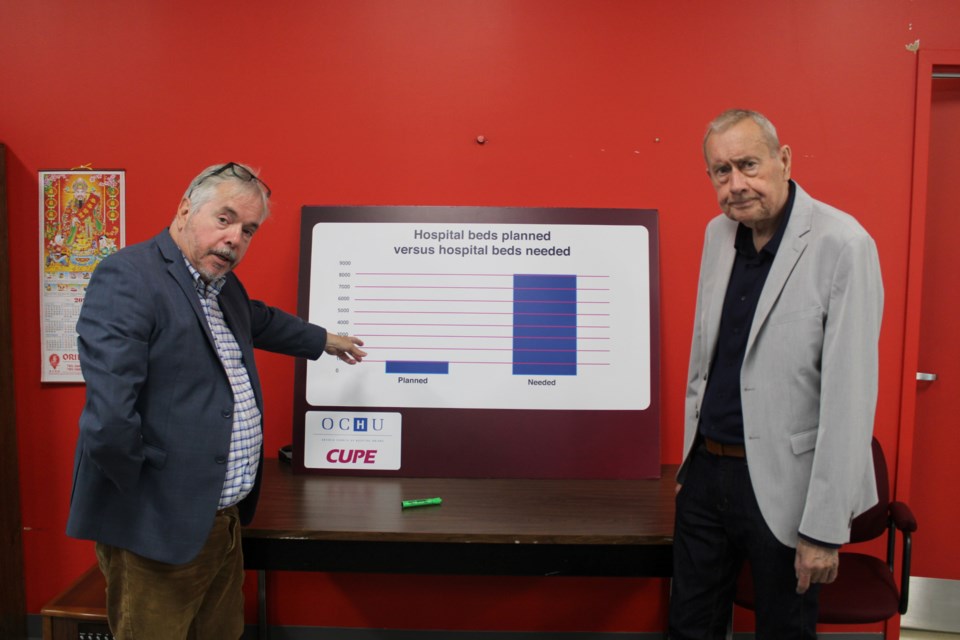Ontario’s hospital system is in decline, and will remain in its present downward spiral under the leadership of Premier Doug Ford, whose attempts at addressing it have been a “total failure.”
This, according to CUPE’s Ontario Council of Hospital Unions, whose representatives held a media conference with local reporters at their Sudbury office on Friday afternoon.
“The provincial government, hand in heart pledged in 2018 ... to end hallway health care,” CUPE hospital sector research chair Doug Allen said, describing this effort as a “total failure.”
The union’s latest report, titled “The Hospital Crisis: No Capacity, No Plan, No End,” compiles various statistics to show how the hospital system has degraded under the current government.
Under the Progressive Conservatives, hallway health care has increased by 22 per cent, Allen said, reaching a new high of 1,289 patients per day being treated in hallways and non-traditional spaces.
So-called “hallway medicine” has been a regular target of the Ontario NDP, and the need to expand Health Sciences North has been a longstanding point of advocacy, and was a sticking point during last year’s HSN annual general meeting.
With emergency rooms full, paramedics have been forced to wait for patients to be admitted.
Last year, Greater Sudbury paramedics spent 3,881 hours on ambulance offload delays at Health Sciences North, which is an increase of 5.5 per cent compared to 2021.
This is the equivalent of a crew being stuck at the hospital for 12 hours per day, every day.
CUPE’s solution is to increase the number of hospital beds in Ontario by 8,170 over the next four years, which would be accompanied by 60,000 extra hospital staff.
Greater Sudbury’s share would be 104 extra beds and 1,007 additional staff members over the next four years.
Provincially, the cost of the expansion would be approximately $1.25 billion per year, while the cost to expand Health Sciences North was estimated at approximately $20.4 million per year.
This would bring Ontario hospitals “in the realm” of the Canadian average, Allen said.
The province's current plan is to add 1,000 beds across Ontario in the next four years.
“I would say it’s a realistic ask, which a government committed to ending the hospital crisis could do,” Allen said. “It’s not like a wartime mobilization of ending the crisis, it’s a consistent plan where we increase capacity at a reasonable rate.
“Will it solve all of our problems? No, it won’t.”
Sudbury.com reached out to the province for comment, and Minister of Health Sylvia Jones’ spokesperson Hannah Jensen noted that Jones was in Sudbury last month to announce three new health teams for the North.
The spokesperson notes that the health budget has increased by more than $16 dollars since 2018, the workforce has grown by more than 63,000 nurses and 8,000 physicians, with 3,500 hospital beds added across the province.
At Sudbury’s NOSM University, 44 new undergraduate and 63 new residency seats have been created, they’ve “broken down barriers” by allowing health-care workers registered in other provinces and territories to begin work immediately in Ontario, reduced financial barriers for nurses, and are getting “shovels in the ground” for 50 hospital developers over 10 years which will add 3,000 beds.
Reflecting on the province’s statement, Allen said, “And yet we’re in this crisis.”
CUPE Ontario Council of Hospital Unions president Michael Hurley pulled aside the addition of three new Ontario Health Teams as a positive, but that it does little to address the strain felt in the hospital system.
“Family health teams may end up referring people to HSN for treatment, or people may require emergency care, and when they go there what they experience are protected waits in ER,” he said, noting that the hallway medicine currently provided is not “dignified care.”
Tyler Clarke is a reporter at Sudbury.com.
